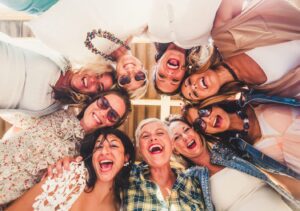
女性生殖激素的健康对维持整体健康起着至关重要的作用。我们的生殖激素会影响我们的能量水平、身体结构和力量、情绪、大脑功能和睡眠,甚至消化和新陈代谢。我们的新陈代谢和微生物群当然也会影响我们的生殖健康。因此,如果我们的荷尔蒙、新陈代谢和/或微生物群失去了平衡,我们不仅可能会遇到月经问题,还可能会感到浑身乏力,至少可以说这是不好玩的。
研究表明,仍然过着祖先狩猎/采集生活方式的人类,并没有经历发达国家中与生殖功能障碍或更年期相关的大量痛苦,这很可能是由于相对健康的新陈代谢。在考虑什么能在任何年龄或阶段支持我们的荷尔蒙和新陈代谢时,我们可以考虑我们饮食和生活方式的差异。因此,虽然我们可能不想 "把孩子和洗澡水一起倒掉",回到没有那么多先进技术的生活,但我们仍然可以从我们人类和类人猿祖先的生活方式(以及那些仍然在生活的祖先)中寻找线索,了解如何预防现代人类日益增多的一些退化性疾病。这篇文章很大,分两部分,请抓紧时间,让游戏开始吧!
祖先生活的人类

地球上还留存着一些传统人类,他们的生活和饮食习惯已经延续了数千年。虽然他们无法获得现代先进的医疗保健服务,但他们几乎没有退行性疾病,也不需要长期服用药物。研究表明,他们拥有健康、平衡的微生物群和功能良好的生殖系统。它们似乎是通过以下方式实现这一点的
- 摄入营养丰富的饮食,以动物性食物为主
- 体验与地球和彼此的深层联系
- 拥有支持性的社会和家庭网络
- 几乎不接触电磁场、永久/有毒化学物质或空气污染
- 终生保持活跃,总体压力较小
- 每天沐浴在自然光下,晚上有篝火照明
- 经常暴露在寒冷或炎热的环境中
科学研究表明,这些生活方式有助于调节人体的昼夜节律、健康的新陈代谢、平衡的荷尔蒙和生殖功能、良好的睡眠、氧化还原潜能、压力管理以及天然的高 "感觉良好 "荷尔蒙。
第 1 部分 - 光、饮食和联系
灯光
在考虑荷尔蒙健康时,接触自然光是最重要的因素之一。我们是在户外进化而来的,祖先生活的人类仍然将大部分时间花在户外。安全的自然光照射,尤其是通过我们的眼睛和大脑的嗜上核(昼夜节律起搏器)照射,是平衡我们的荷尔蒙和神经递质以及昼夜节律的关键--这不仅仅是维生素 D 的问题!昼夜节律是 24 小时的内部时钟,通过褪黑激素(睡眠)和皮质醇(觉醒)等激素调节我们的睡眠/觉醒周期。简单地说,阳光中紫外线、蓝光和强光的光谱和数量在一天中不断变化,有助于在正确的时间触发正确的激素和神经递质的释放,红色和红外线光谱有利于我们的线粒体和激素的分泌。
荷尔蒙和昼夜节律紊乱带来的负面影响与慢性疾病有关,尤其是代谢功能障碍和血糖失衡。它还可能导致生殖问题,在任何生命阶段都可能表现为睡眠不佳、情绪低落、易怒、忧心忡忡等。在围绝经期,这些问题会更加严重,同时还会出现体内温度波动、关节僵硬、脑迷糊、易怒等症状。
此外,闪烁是大多数人造光源的特性,会对人体健康造成危害--太阳光没有闪烁。我们最近才把所有灯泡从白炽灯(宽光谱、低强度、低闪烁光)换成发光二极管(窄带、蓝光、高强度、高闪烁),因此研究表明,现代人可能缺乏红外线,甚至可能缺乏紫外线!

- 阳光能刺激细胞褪黑激素和感觉良好的荷尔蒙和光产物,有助于免疫健康、身体舒适和精力充沛。
- 阳光有助于提高孕酮和睾酮水平,促进健康生殖,并有助于管理一氧化氮水平,这对心血管系统非常重要。
- 我们从夏季安全的正午阳光照射中获取维生素 D3,这也有助于生殖和孕酮的产生。
- 阳光中的红外线有助于在血管(对健康的血液流动至关重要)和细胞内外产生排除区水,以支持能量的产生。
- 阳光有助于人体平衡氘(重氢)水平、体内微生物群(各类微生物对自然光/暗周期做出反应)、血糖等。
- 研究发现,缺乏日照与更年期过渡更早、症状更强烈有关。这意味着,阳光照射不足几乎肯定会对妇女整个生育期的生殖健康产生不利影响。这些研究和许多其他研究表明,我们从太阳中获得的自然光不足,尤其是在清晨,而在入夜后,我们从现代灯泡和设备屏幕中获得的人造光过多。
流明是对发出光线的测量,而勒克斯则是表面光线的强度。研究表明,每天接触强勒克斯(环境中光线的亮度)与一天中接触全光谱的阳光同样重要。研究表明,白天更亮、夜晚更暗与较早的全因死亡率下降 40% 有关。阳光,即使在阴天,也比我们家里或办公室里的光线明亮,白天缺乏明亮勒克斯的照射,日落后又缺乏低勒克斯的照射,会导致睡眠问题。甚至有证据表明,夜间非常明亮的火光或烛光会导致睡眠不佳,这表明我们中的一些人在恢复昼夜节律健康时,可能需要避免夜间除最低勒克斯以外的所有光线。就光线中红外线和蓝光的比例而言,清晨和傍晚的阳光为 3:1,中午为 1:1;而火光、烛光和白炽灯泡为 10:1,这使得它们在天黑后成为很好的红外线来源,因此尝试烛光的暗度/亮度可能会有好处。睡眠是荷尔蒙和整体健康的关键,从阳光和黑暗中获得正确的暗示有助于褪黑激素的分泌和酣睡。
说到睡眠,因为有多种因素会影响个人的睡眠模式,所以除了本系列文章提到的方面外,可能还有其他需要考虑的事项;不过,一些荷尔蒙方面的小贴士包括:确保在睡觉和起床之间留出足够的时间(8-10 小时);争取最晚在晚上 9 点或 10 点前入睡--越早越好;注意季节性--冬天是需要更多睡眠和休息的季节。养成有效的睡眠卫生习惯,尽可能早睡早起,这将对您大有裨益。你可能会发现,采用狩猎采集生活方式中的阳光和昼夜节律健康部分,会自动帮助你更早入睡,从而能够更早起床。"日出;日照;日落;睡眠;重复"。
因此,如果你能让太阳光成为你每天清晨看到的第一道光线,在戴太阳镜时更有辨别力(例如,只在开车、滑雪或划船时戴),如果你不能更换灯泡,就在黑暗中尝试琥珀色/红色的蓝光阻隔眼镜,白天尽可能多地到户外活动,以及其他美妙的阳光疗法,你可能会发现你的昼夜节律健康和荷尔蒙健康都得到了很大的支持。
注意:新西兰和澳大利亚的阳光非常猛烈,因此在夏天的正午时分,皮肤较白的人一定要注意防晒,如有疑问,请遮盖起来,躲到阴凉处(您仍然会受到自然光的照射),或在裸露的皮肤上使用天然防晒霜。即使是肤色黝黑的狩猎采集者也会在中午时分寻找阴凉处。防晒霜可能会有问题,因为它可以阻挡紫外线,但会让高能量的蓝光等进入皮肤,从而阻碍皮肤中保护物质(包括黑色素)的生成。所有紫外线都可能导致光老化,因此皮肤较白的人即使在晨光中也要小心--戴帽子!

集中智慧:
- 青少年和青春期:帮助他们与自然光建立合理的关系。限制他们晚上看屏幕的时间,引导他们将晚上的睡眠时间提前,这样他们就不会养成睡懒觉的习惯,也就不会错过早晨必不可少的红外线和日常亮光。
- 生育年龄和生育能力:健康的阳光照射与健康的生育能力有关。养成清晨接受红外线和 UVA 照射的习惯,以促进荷尔蒙平衡。如果你在办公室工作,可以在办公桌旁边放一盏白炽灯。
- 孕期:孕期晒太阳能让婴儿更健康,减少早产。夏天穿轻薄的衣服防晒,但不要惧怕阳光--孕妇的肚子会根据孕期的不同阶段吸收适当光谱的阳光。
- 更年期:考虑光疗。红光和红外光对情绪、睡眠、荷尔蒙、关节、皮肤健康、血液循环和放松都有帮助。但阳光中的完整光谱确实无可替代......而且是免费的!日出、清晨的 UVA、中午的强光、入夜后的火光或蓝光阻挡都将是你最好的朋友。
饮食

饮食对我们的健康也起着重要作用。在考虑什么是健康饮食时,我们不妨摒弃饮食战争和教条,简单地考虑一下我们需要什么来滋养、保护和激发我们的身体。我们希望尽可能从真正的食物中获取氨基酸(蛋白质)、必需脂肪、矿物质、维生素、能量基质(脂肪/碳水化合物)和辅助因子。我们可能希望学会用传统方法烹制这些食物,以最大限度地提高生物利用率。我们可能希望按照我们的祖先和祖先生活的环境来进食,但也要适应我们现在生活的当地和季节性食物。我们可能要注意自己的新陈代谢健康以及肝脏和甲状腺功能,如果有问题,可以考虑针对我们的生物个体差异寻求专业指导。我们的新陈代谢健康指的是将食物转化为人体燃料的生化过程,以及线粒体的运作情况。
世界各地过着祖先生活方式的人类有以下共同的饮食习惯(均有科学研究支持......):
- 他们就地取材,按季节饮食。
- 他们不吃精制、变性和现代超加工食品。
- 他们优先考虑营养丰富的动物性食物,包括内脏、动物脂肪、鸡蛋、生乳制品、贝类和鱼卵等。这些食物中含有对生殖激素和新陈代谢健康至关重要的基本成分和生物可利用的微量营养素。
- 他们生吃一些动物性食物,烹饪或发酵(解毒)植物性食物。
- 他们食用乳发酵调味品和饮料。发酵剂比纤维更有利于微生物群的健康和平衡。
- 它们食用动物脂肪是为了获得必需的脂溶性维生素(A、D3、K2 和 E)、胆固醇、DHA、EPA、C15、花生四烯酸和其他健康脂肪酸。植物脂肪会消耗这些脂肪酸,造成欧米伽的失衡和亚油酸的过度摄入。
- 它们不使用对人体新陈代谢和荷尔蒙健康有害的种子油/植物油或精制糖。
- 他们大量使用未经提炼的全盐,通常是海盐。令人惊讶的是,全盐(和钠)的低摄入量与经前和怀孕问题、雌激素过多、水肿、低能量等有关。
- 他们将凝胶状的骨头和结缔组织汤制成汤、炖菜、肉汁和酱汁,并每天饮用这种富含胶原蛋白的肉汤。
- 他们中经常吃植物种子--谷物、豆类、种子和坚果--的人不多,但即使吃,他们也会花时间浸泡和发酵,以尽量减少抗营养素,提高消化率。在研究小组中,他们吃的种子食物越少,他们就越健康、越长寿...
有趣的是,最近对传统和史前人类群体狩猎习惯的研究发现,女性有意识地从事狩猎活动,拥有 "工具包 "和喜爱的武器。甚至祖母也是熟练的狩猎者,并被誉为狩猎和捕猎的最佳老师(这也是女性更年期后寿命延长的潜在原因)。参见 3 位女士与女性荷尔蒙生命周期,第 3 部分 - 更年期).有偏见的科学家以前曾否定史前女性的狩猎能力,即使他们找到了大量相反的历史证据--女性带着狩猎武器被埋葬等。最近的另一项研究得出结论,史前狩猎,即使是狩猎大型猎物和巨型动物,也是一个不分性别的过程。男性和女性都被发现与狩猎武器一起埋葬。

集中智慧:
- 青少年和青春期:传统人类注重动物脂肪中的欧米茄、脂溶性维生素和胆固醇(性激素的前体)。如果您担心动物脂肪,请不要... 查看 "脂肪分为饱和脂肪和不饱和脂肪。知道区别吗?"了解脂肪的皮毛。他们还会让孩子品尝发酵食品。此外,所有矿物质都是必需的,但碘的摄入量和甲状腺的健康在青春期成为重点。
- 生殖期:传统人类限制饮酒,优先考虑肝脏健康,这样才能正确代谢荷尔蒙。吃一顿含有蛋白质和脂肪的营养早餐,是大脑、甲状腺和荷尔蒙充盈的二级昼夜节律信号--经常不吃早餐会导致新陈代谢减慢和体重增加。食用动物蛋白有助于孕酮的分泌。在一天的另一端,睡前 3-4 小时停止进食,以保证睡眠质量。参见 良好的健康周期平衡 草药荷尔蒙支持或 Good Health Pro Flora Care 为泌尿生殖系统微生物群提供支持。
- 生育能力:传统饮食强调在男性和女性受孕前和怀孕期间摄入营养丰富的内脏(尤其是肝脏)和/或海鲜(鱼子是生殖的动力源泉)以及动物脂肪,以增加营养。
- 更年期:传统人类利用骨头汤等富含蛋白质和胶原蛋白的食物来支持关节、骨骼强度、结缔组织健康和血糖平衡,并利用动物脂肪来促进大脑、荷尔蒙、心脏、关节和皮肤的健康。骨骼健康不仅与钙的摄入量有关--骨骼的矿物质含量可能很高,但由于胶原蛋白(蛋白质)结构的丧失而变得脆弱,因此动物蛋白质和矿物质是首选。确保优化消化以促进吸收,并确保新陈代谢健康,因为新陈代谢健康似乎会影响围绝经期症状。如果你还没有从饮食中去除种子油/植物油,这将会有很大帮助。研究表明,动物脂肪能支持和保护肝功能,而肝功能对荷尔蒙健康非常重要。查看 好健康 Peri-Meno+ 用于围绝经期草药支持。
连接

众所周知,传统群体和狩猎/采集社会的家庭和社区非常相互支持。他们乐于彼此亲近,内向的性格闻所未闻。亲密关系使人体内更容易产生催产素("拥抱激素")等感觉良好的激素和神经递质,从而控制压力,增加幸福感和对生活的满意度。我们甚至会与那些与我们有联系的人共享微生物组。科学研究甚至发现,社交互动和情感支持在控制皮质醇方面发挥着作用。作为人类动物,我们本应每天都感觉良好,但在西方世界,我们中的许多人都在利用食物、酒精、毒品、电视和社交媒体来应对现代生活方式中固有的分离和缺乏联系。此外,不良的饮食习惯、缺乏阳光等也会影响获得自然 "极乐 "感觉的能力。
我们现在知道,与所爱的人建立联系、自爱和mana(尊重)以及强大的社会和家庭支持网络对整体健康的重要性。研究表明,我们与自己和他人的联系有助于激素平衡。众所周知,我们的想法会影响我们的生理机能,因此,往好的方面想(积极的自我对话)也很关键。随着年龄的增长,学习新技能对大脑健康非常重要,这只会有助于我们的荷尔蒙功能。拥有目标和享受创造性的努力可以增强人与人之间的联系感,而与内心的孩子建立联系的技巧(内在联系)可以加强以心为中心的交流。我们可以通过定期关爱自己来为身体创造能量,支持我们感觉良好的化学物质。
在整个育龄期,练习内在联系和自我保健、每天都有目标感和/或进行创造性或教育性练习、建立社交关系和加强家庭纽带,这些都有助于女性荷尔蒙的平衡,帮助女性更顺利地度过更年期。
还有证据表明,我们与大地和自然的联系对我们的健康非常重要。一些传统的人类仍然赤脚在大地上行走,或使用天然材料制作鞋袜,并在自然环境中生活。研究表明,经常赤脚接地或接耳可以支持我们的昼夜节律和生物钟,从而支持我们的女性荷尔蒙。接地和在大自然中生活已被证明有益于人体微生物群以及我们的情绪、免疫健康和荷尔蒙,因为我们可以接触到各种孢子、微生物和自然声音。当我们脚踏实地或身处大自然时,我们的脑电波会显示出放松状态 "阿尔法 "脑电波的增加,这也是我们在灌木丛或森林中漫步("森林浴")或赤脚在海滩上体验到平静感的原因之一。在自然水体中游泳是接地的终极方式,它能让你在户外进入一些凉爽或冰冷的水中(见 第二部分).

集中智慧:
- 青少年和青春期:自爱是预测健康最有力的因素之一。教会他们自爱和自尊,让他们学会建设性和积极的自我对话(思想),你将为他们的一生打下坚实的基础。
- 各个年龄阶段的成年人都可以从学习自爱技巧中获益,比如建立内在联系和实施自我保健程序,这可以帮助你与他人建立联系。
- 赤脚在草地或海滩上行走,每天只需 30-60 分钟,各个年龄阶段的人都能从中受益。
- 喜欢冒险的人可能希望将冷水浴、森林浴和清晨的日光浴与脚踏实地结合起来。
如果您对自己的生殖和/或荷尔蒙生活的任何部分有任何担忧,请去看全科医生,或与自然健康专业人士联系,以定制个性化的饮食、生活方式和草药补充剂。
以及妇女健康系列的其他内容:
